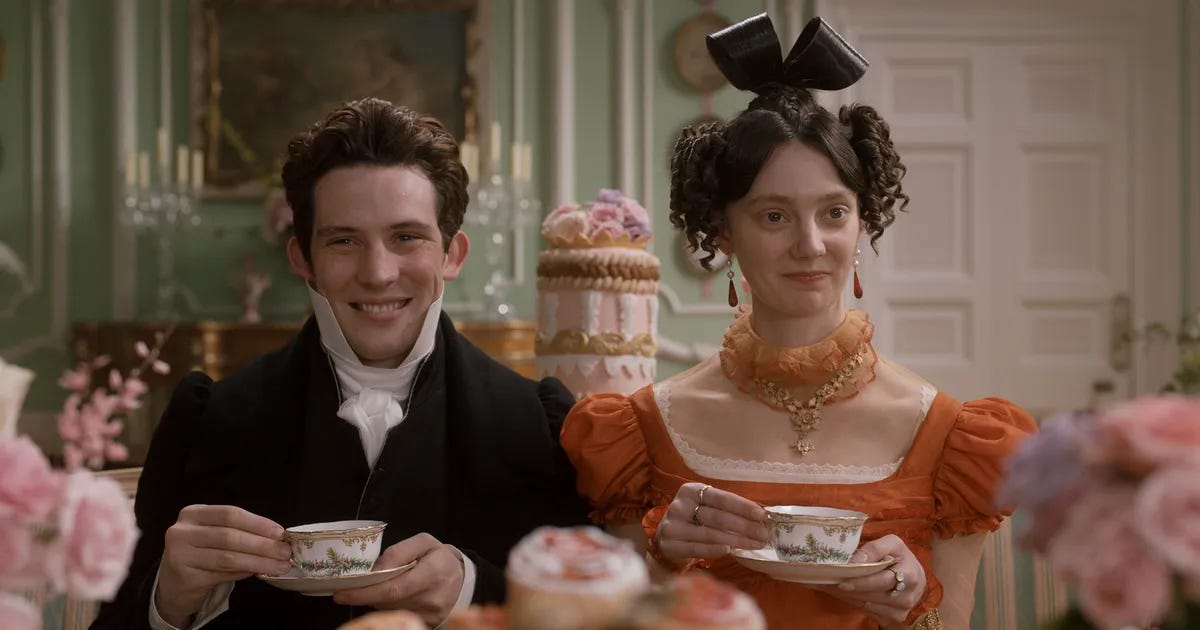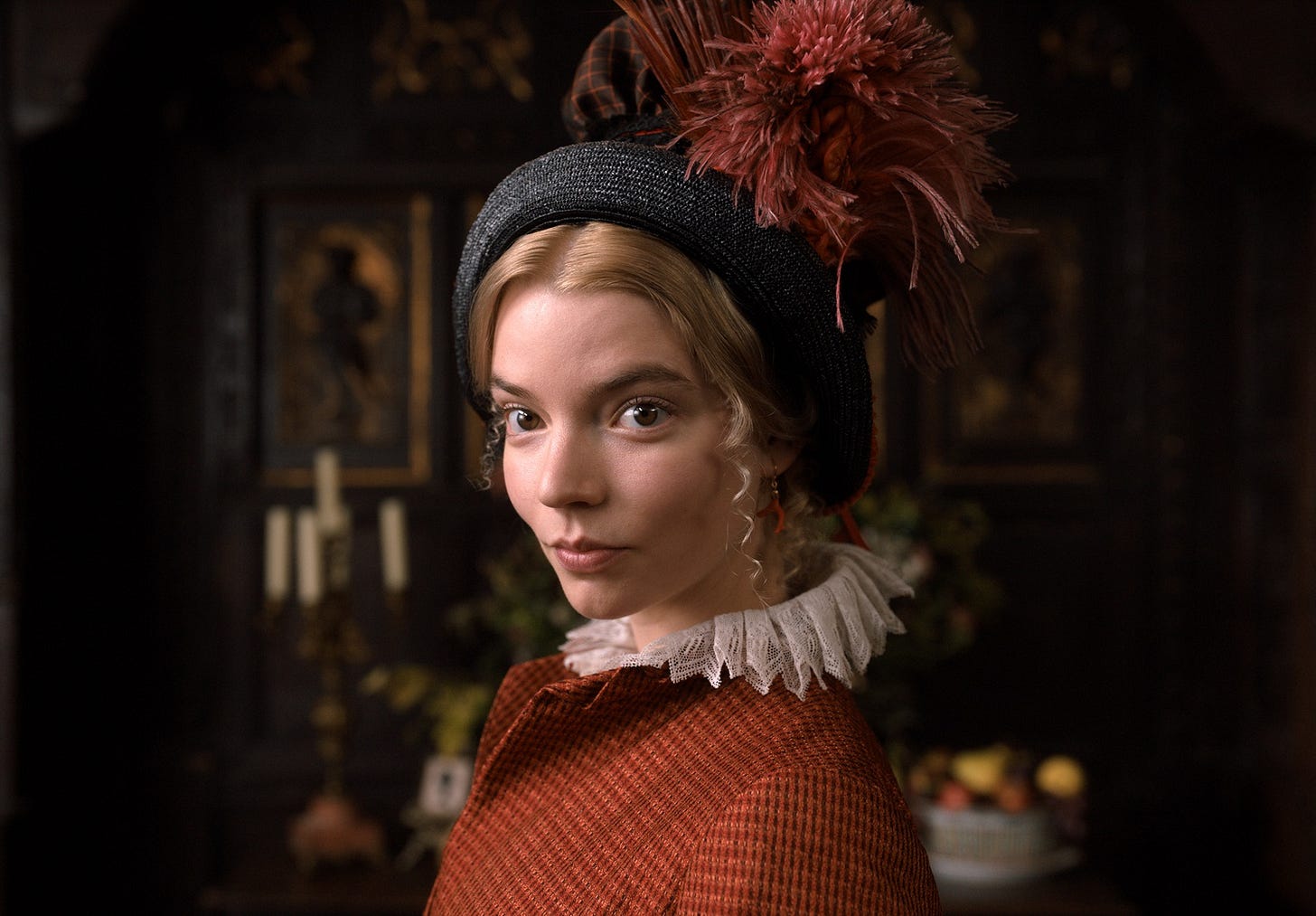Part 2: Don't Watch Persuasion; Watch EMMA.
A comparison of two Jane Austen adaptations, four years after we received the brilliant film by Autumn de Wilde
Thank you for tuning in to Part 2! I wrote the first few paragraphs of this piece several years ago, and I finally sat down to round it out on February 20, 2024, to celebrate four years of Autumn de Wilde’s EMMA.!
Please do let me know if you watch it (or if you watch Love & Friendship) and let me know what you think!
The story of Emma Woodhouse is a bit of a comedy of errors. At the center is a young lady, prideful and privileged, but who uses her position in society for the betterment of others. Or so that’s what she believes, as she meddles in the lives around her. For all her good intentions, Emma does not always see things clearly. Yet, there is no one to reprimand or correct her because she has won everyone’s affection to the neglect of their constructive criticism.
Emma is a powerful woman. She senses that power, but does not understand the extent of her influence and, therefore, how much her meddling could do real damage to her community. The only one who is willing to stand up to her is Mr. Knightley. But Emma feels she can dismiss him because he’s a bachelor who comes and goes as he pleases, keeps his house closed to the public, and does not have any intention of settling down.
Knightley a good bit older than her and great friends with her father. If you’ve read the book or seen the Gwyneth Paltrow 1996 adaptation, you know that Emma has grown up with Knightley around. He’s a good deal older than her—in his teens when she was a baby—and so he feels like an older brother to her, especially when he’s pointing out Emma’s flaws.
It’s only when Emma monstrously messes up that she realizes how deeply she respects Knightley, and desires his respect and admiration (always cloaked as backhanded compliments) in return. And it’s when she’s close to losing Knightley that she realizes her true feelings for him.
All of this grand storytelling is set in the English countryside that somehow feels a bit French. The dresses are frilly, the sitting rooms baroque. The hats are absurd, the colors are bright, and the ringlets impossibly curled. If the settings and costume design feel so saturated, you can only imagine the characters!
The titular character is played by the incandescent Anya Taylor-Joy (this came out before The Queen’s Gambit and was my personal introduction to her). Bill Nighy plays her endearingly hypochondriac father. Josh O’Connor, whom I knew from The Crown, is an incredibly cringy Mr. Elton. You cannot take him seriously at all, and it must have been so fun to play that role. Tanya Reynolds later joins him as Mrs. Elton, and is entirely absurd. She reminds me of a parakeet. Or a poodle. Or both.
Miranda Hart is a hopeless Miss Bates. Even as you understand Emma’s impatience with her, you feel for her because she simply means so well. Mia Goth is a frivolous and naive Harriet Smith. Gemma Whelan is a warm and motherly Mrs. Weston. Amber Anderson is a mysterious and sympathetic Jane Fairfax, Emma’s rival in romance. And Callum Turner, whom I knew from the BBC’s 2016 War & Peace, is a sly, dashing, and untrustworthy Frank Churchill.
Last, but not least, we have Mr. Knightley, played by Johnny Flynn, also a musician who wrote and sang the closing credits song. He’s brusque yet kind, and really the only person you can take seriously for most of the film. While all the others live in a dream social world of their making, Mr. Knightley brings them all back down to earth when they need it. He sees people as real people. This is his virtue, and what he eventually teaches Emma.
Director Autumn de Wilde did such an excellent job of directing each of these talented actors. The cast of characters is wide, but each one is deep, developed, believable even in their exaggeration. As a whole, they are cohesive. As rich and vivid as the backdrop of EMMA. is, each character stands out even more distinctly. There are no holes in their backstories, no weak links, and I think this is one of the reasons the film works so well.
But there is another reason Autumn de Wilde’s telling of this beloved Jane Austen classic is so successful.
One of Jane Austen’s authorial goals is to point out the weaknesses and absurdities of societal convention. Far from condoning the rules of etiquette that would lead to such mistakes in matchmaking that Emma commits, Austen wanted to satirically bring light to a flawed system.
Yet we often think of Jane Austen as a great writer of romantic drama. Could this be because one of the most iconic scenes (for me) in the Jane Austen film landscape? Darcy, played by Matthew Macfayden, walking purposefully across a field at dawn, white blousy shirt open at the neck, toward a breathless Kiera Knightley? Perhaps a hearkening back to the 1995 BBC adaptation, when Colin Firth as Mr Darcy, after swimming in a nearby pond in his undergarments, runs into Elizabeth visiting his estate with her aunt and uncle? How much have the 1995 and 2005 Pride and Prejudice adaptations shaped our tonal concept and expectations of Jane Austen’s stories?
I am one of those people who really loves the 2005 Pride & Prejudice. And the older I get, as I rewatch it, the more I notice the humor throughout. But the tone of the film says: romance, longing, desire, heartbreak and triumph. It’s moody, earthy. And, I think, entirely wonderful!
But EMMA. takes a different approach. It highlights the life of high society, since Emma Woodhouse is from a wealthier family than Elizabeth Bennett. It also highlights the class system, and the idea that certain people of a lower class cannot possibly hope to be matched with someone of a higher status. Emma match-makes, sure, but it’s all well within the reason of the day. And while perhaps Pride & Prejudice (2005) is more sincere in it’s telling, EMMA. is aware of all the little hypocrisies and double-standards.
As my favorite critic, Alissa Wilkinson, writes in her review of EMMA.:
Austen’s novels, to one degree or another, acerbically skewer the self-important landed gentry of her time and, to a lesser extent, the people who aspire to be in their company. What made her so masterful was her rare ability to combine that satire with authentic romance and unforgettable heroines, who have real and complex desires of their own. But take Austen’s satire out of Austen, and you’re left with swoony, frothy romances in Regency dresses.
There’s something sharper and more clear-eyed than simply ruffles and carriages in Austen, something most adaptations flatten out in favor of the romance and a few arch jokes. (To date, the only film I truly think gets Austen’s tone right is Whit Stillman’s 2016 Love & Friendship, but because it’s based on an unpublished and unfinished Austen novel, it comes up less frequently in conversation.)
To my eye, Emma (stylized EMMA. in the film), directed by photographer and music video director Autumn de Wilde, gets the balance just right. This new Emma doesn’t play too fast and loose with the story or its most familiar beats, but it digs out the absurdities of being wealthy (or adjacent to wealth) around the turn of the 19th century — the affectations, the frills that cover up the crudeness of real life, and above all, the vast, unmitigated boredom.1
The rest of Wilkinson’s review is, not surprisingly, perfect! I’ve linked it below, and encourage you to read it.
In the meantime, or after you do, plan an EMMA. movie night. It’s rated PG for partial nudity, and has fairly mature themes, suitable for teenagers and above, male and female alike (as evidenced by the time I watched it with my former housemates). And, as Alissa mentions above, Love & Friendship, available to stream on Amazon Prime, would make for a wonderful follow-up, if you can’t get enough of true Jane Austen satire.
“The new Emma adaptation gets Jane Austen’s balance of satire and romance just right”; Alissa Wilkinson, Vox.com






